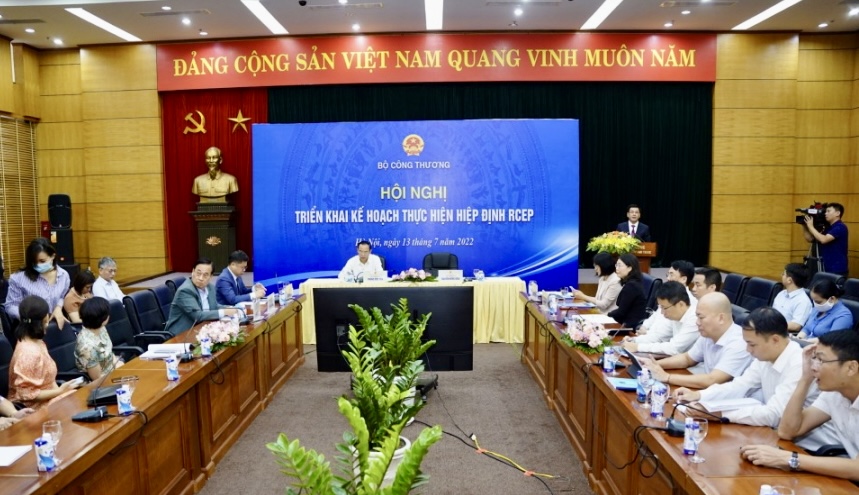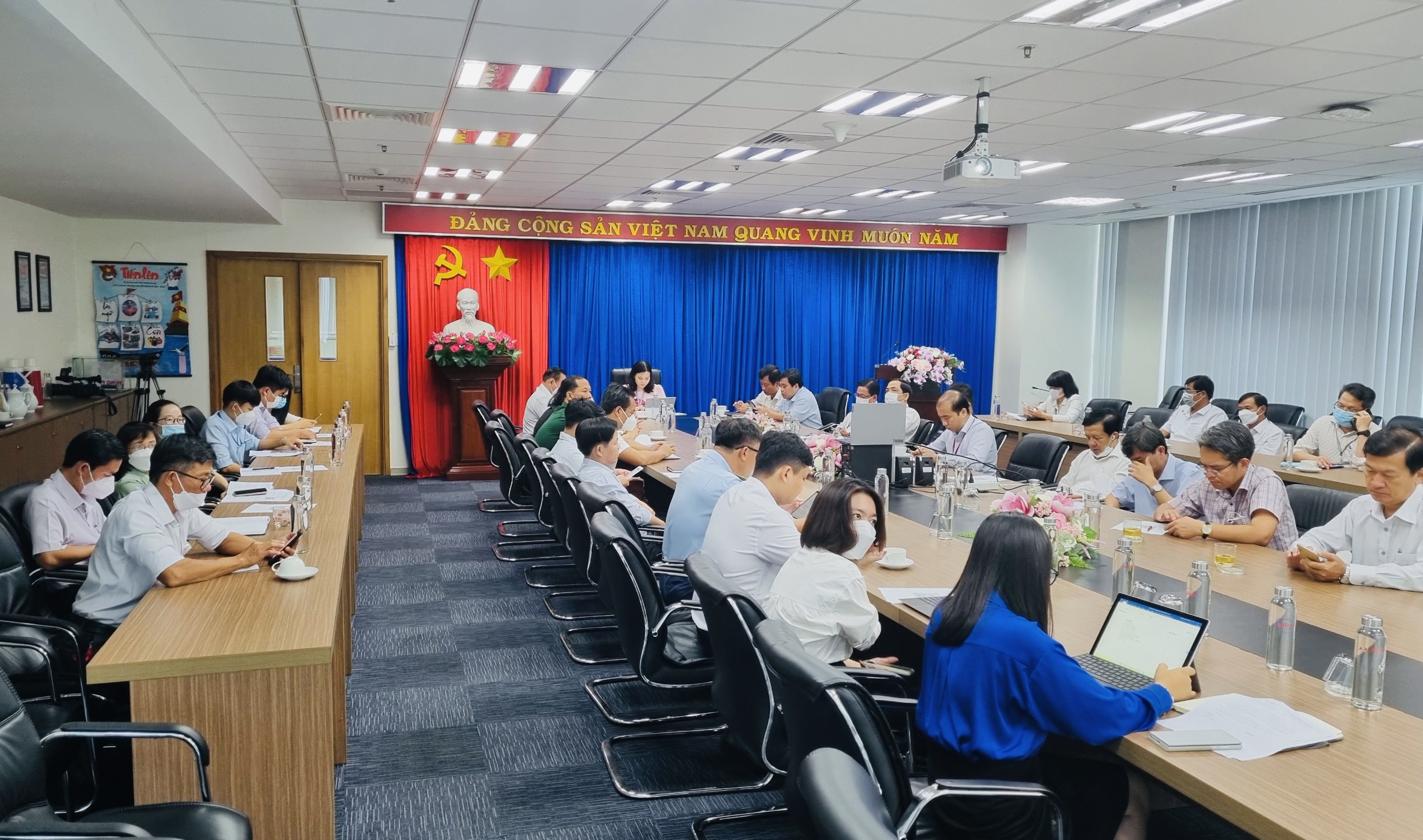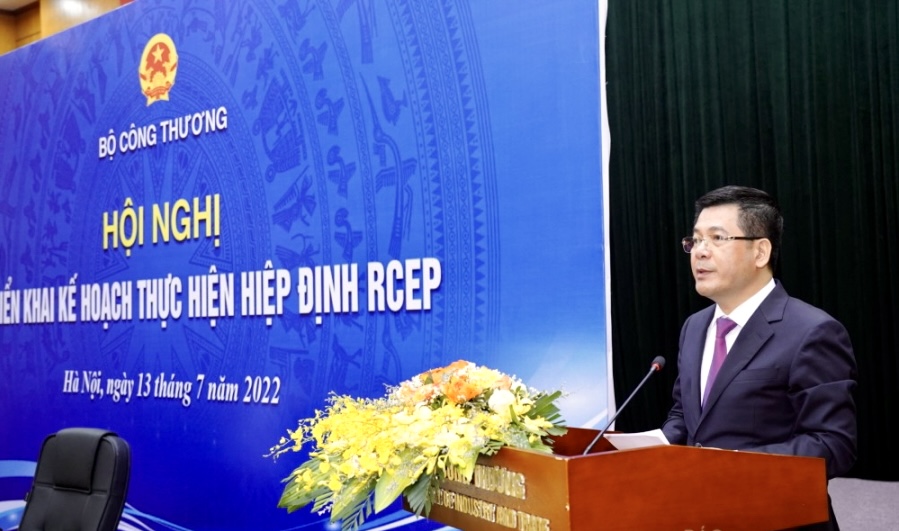At Binh Duong bridge point, there were leaders of departments, committees and branches.
Over the past 02 years has been a challenging time for every country in the world, including Vietnam due to the Covid-19 pandemic. However, our country has gradually overcome difficulties and challenges and achieved positive and relatively comprehensive results in all fields.
In which, there is an important and positive contribution of international economic integration, especially making good use of opportunities and advantages from the Free Trade Agreements (FTAs) that Vietnam has signed to expand and diversify export markets and products, most recently the Regional Comprehensive Economic Partnership - RCEP. This is a free trade agreement signed by 10 ASEAN member countries and 5 partner countries, Japan, Korea, China, Australia and New Zealand on November 15, 2020, and officially took effect from January 01, 2022. This Agreement is the connection of 04 existing FTAs between ASEAN and partner countries into 01 largest FTA in the world in terms of population size (accounting for nearly a third of the world's population and global GDP).
The implementation of the RCEP with a common rule of origin applied to 15 countries is expected to create great opportunities for the Vietnamese enterprise community to develop new supply chains, at the same time, open up a common production space and a "super" large-scale, stable and long-term export market for domestic enterprises, especially in the agricultural branch.

Overview of the conference in Hanoi
Once fully implemented, the RCEP will form the world's largest free trade area with 2.2 billion consumers, accounting for about a third of the world's population and global GDP. Strong commitments on market opening in the fields of goods, services and investment, especially the application of a common rule of origin for the 15 countries in the Agreement, will be favorable conditions for the formation and development of new supply chains in the region that the Vietnamese enterprise community will have the opportunity to participate in.
However, besides opportunities, there are also many difficulties and challenges because the economies in the region are quite competitive, even in fields where our country has strengths. Vietnam's goods and services will be under great competitive pressure, especially in the context that our country is still heavily dependent on imported raw materials and auxiliary materials. This reality requires domestic enterprises to actively adapt, strive to conquer and turn challenges into opportunities to compete successfully in both the domestic market as well as in the international market.

Overview of the conference at Binh Duong bridge point
In order to effectively implement the RCEP, support the domestic enterprise community to maximize and effectively exploit opportunities and benefits, as well as minimize risks and challenges that the Agreement may bring, the conference discussed and recommended many tasks and solutions to focus on implementing, helping localities, trade associations and enterprise communities effectively exploit and promote their potentials and strengths to develop products, build brands, diversify markets, and promote exports.
Speaking at the conference, Minister of Industry and Trade Nguyen Hong Dien welcomed and highly appreciated practical recommendations from ministries, branches, localities and enterprise associations at the conference. At the same time, he suggested that the ministries, branches and localities soon complete the promulgation of the Agreement implementation plan according to their assigned functions and tasks to ensure the effective implementation of the Agreement; continue to promote propaganda and dissemination of the Agreement and related legal documents; proactively review, amend, supplement or advise the competent authorities to promulgate synchronous and feasible mechanisms and policies, and to develop intensive skills training and support programs, helping Vietnamese industries and enterprises improve their competitiveness, meeting the requirements of deeper participation in global value chains and supply chains. The Ministry of Industry and Trade will always accompany and support localities, industries and enterpises to make the best use of the Agreement's incentives, contribute to promoting the development of production and export, actively contributing to the development of the country.

Minister of Industry and Trade Nguyen Hong Dien speaks at the conference
In Binh Duong province, on March 25,
2022, the PPC issued Decision No. 734/QD-UBND approving the implementation plan
of the RCEP in the province. Accordingly, in the 2022-2024 period, the
Department of Industry and Trade will coordinate with relevant agencies to
disseminate and propagate the RCEP to state management agencies, the enterprise
community, trade associations, cooperatives and people.
At the same time, focusing on training for
officials of state management agencies as well as enterprises in a number of
key areas such as taxation, rules of origin, market access in countries
participating in the RCEP, investment, services, customs, government
procurement, trade defense, intellectual property, etc. ensuring that enterprises
and officials of state management agencies understand clearly, understand
correctly, thereby helping to make full and effective use and implementation of
the Agreement.
At the same time, consolidating the
network, strengthening capacity and promoting the provision of information,
forecasting on export, import, and domestic markets by State agencies with the
function of providing information on trade – investment so that Binh Duong
enterprises can promptly grasp information, technical requirements, regulations
on goods’ import and export management of countries participating in the RCEP, thereby
creating favorable conditions for enterprises to plan and implement domestic
and foreign investment strategies, etc.
Reported by Doan Trang- Translated by Thanh Tam